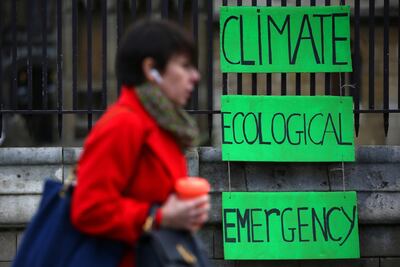The power of collective action is evident in the global response to coronavirus. However, while countries harnessed technology across sectors – health, education and research – the pandemic exposed the fragility of the global economy.
In less than a year, over 1.5 million people have died of Covid-19 and tens of millions have lost their livelihoods.
The projections appear bleak. The number of people living in extreme poverty will increase by 420 million in 2020, according to the United Nations Industrial Development Organisation. To pave the way back from this wreckage, sustainable finance is all the more crucial.
The next decade presents a “use it or lose it” moment for emerging markets that need to reorient their financial sectors.
Globally, to meet the needs of a growing population, investments in infrastructure are expected to reach $90 trillion globally by 2030.
Covid-19 has prompted governments across the world to provide large stimulus packages.

This is a golden opportunity that should not be wasted. It is important that these packages are invested keeping in mind not just traditional finance metrics but environmental, social and governance (ESG) issues.
There need not be a trade-off between financial and non-financial returns. For low and middle-income countries, returns on responsible investment are high, where resilient infrastructure investment is estimated to return $4 on every $1 spent.
To prevent irreversible environmental damage and to stay at the current 1.5 degrees of global warming, countries must drop emissions by 50 per cent over the next decade.

Driven by the growing global commitment to address climate change, over the coming decade we will witness a transformation of the landscape of sustainable finance in emerging markets.
US President-elect Joe Biden sees climate change as an existential threat, saying the US needs to eliminate greenhouse gases by 2050. He proposes spending $2 trillion over four years as a starting point. The EU and China have announced similar ambitions. Financial markets are starting to take note, and to align their models to such goals.
A growing green bond market has grown to help investors position their financial objectives to achieve the targets of the Paris Climate Agreement and Sustainable Development Goals.
In 2018, 80 per cent of the world’s largest corporations used an international independent standards organisation called the Global Reporting Initiative which helps companies, governments and other organisations create a common language to measure and talk about their impact on issues such as climate change.
In keeping with this shift, this year the Dubai Financial Market launched the UAE Index for Environment, Social and Governance to encourage listed companies in the UAE to embrace ESG best practices.
Data, however, is a big challenge in this domain. Globally, sustainable investments require data that is based on ESG metrics but most companies still lack the numbers needed to quantify the impact of their investments. This leads to potential inefficiencies.
There is also a need for better legislation in emerging markets. Until 2018, sustainable financing was regulated only in China. The situation is improving though and there is more attention being given to standardising regulations that foster capital inflows.
The UAE launched its first set of guiding principles on sustainable finance this year at Abu Dhabi Sustainability Week. Indonesia and Brazil have progressed in this regard too.
Of 180 countries surveyed in the Environmental Performance Index 2020, of the world's 25 top environmental performers, 20 are from Europe.
The rest are in Australia, New Zealand, Japan, US and Canada. But a movement to meet sustainable goals is growing in the emerging markets – the 85 per cent that lies outside North America and Western Europe.
The UAE, which just appointed a special envoy for climate change, is at the heart of this movement in the region as the country aims to be a major force for positive change.
The pandemic shifted the emerging markets’ focus to acute social risks such as health and employment. There is no doubt that economic recovery is a priority for all nations even if it may take years.
It is crucial that this time be also used to address the climate change challenge. Covid-19 has been devastating across the world but instead of wasting this crisis, we must build on the opportunity to create a more sustainable future.
Yasar Jarrar is managing partner at International Advisory Group and adjunct professor at Hult International Business School
Ibrahim Al Zubi is the chief sustainability officer at Majid Al Futtaim





















